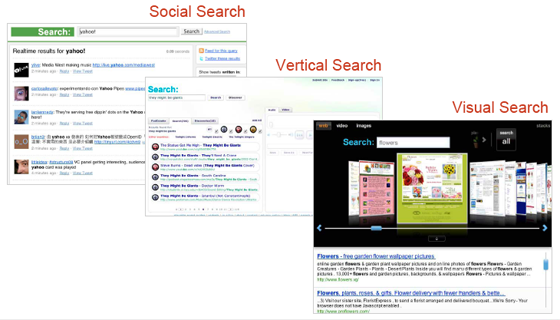
When you’re the distant second player in web search, you’ve got nothing to lose by making bold moves. So it makes sense that Yahoo has adopted an open strategy with the following idea in mind: woo developers to build on top of your technology, and then display your advertisements to more eyeballs throughout the long tail of the web.
Yahoo takes a large step in that direction today by announcing a radical and historical initiative called BOSS, which stands for “Build Your Own Search Service” and basically turns web search into a web service by inviting developers to leverage Yahoo’s core search technology and build their own web search implementations. Hakia and Me.dium are among the first to switch over and use Yahoo to power their web results (in Hakia’s case, as a supplement to its own search technology).
BOSS allows developers to submit queries (and their associated parameters) via an API to retrieve up to 50 web, image, news, or spelling results in XML or JSON format at a time. Per Yahoo’s policy, developers will be required to display its ads next to, or within, their results (although this requirement won’t be imposed until later, Yahoo plans to offer CPM fees as an alternative, and academics will be exempt from any such attempts at monetization completely). Yahoo won’t require anyone to mention that they are using its technology, as it doesn’t intend to drive traffic back to Yahoo proper – just spread its technological influence throughout the web. Nor will it impose any caps on daily queries, or impose standards on the design of results pages.

The self-service BOSS API can be used directly or via a mashup framework that simplifies the process of aggregating data from across the web. When using the API, developers can choose to filter porn from web results, specify the dimensions of image results, and retrieve only news results from within a certain number of days. The order of Yahoo’s results, however, can only be changed after they are retrieved (you cannot pass Yahoo parameters that tweak its standard relevancy model and return reordered results).
If you want to incorporate ancillary data with the results from Yahoo’s main index, the Mashup Framework simplifies the process by which developers conduct joins on web data (in formats like XML, JSON, RSS, or RDF). For example, it can be used to generate results with information from both Summize and Yahoo Search, Digg and Yahoo Search, or pretty much any API and Yahoo Search. The framework will work only through Python constructs to start, but more languages should become supported in the future.

All of this forms just the first half of Yahoo’s intentions with BOSS. In a few months, Yahoo will also release APIs for what it’s calling “BOSS Custom”. This version of BOSS will allow developers to actually push data to Yahoo’s servers for indexing, and then perform highly customizable search queries against them.
So in a way, BOSS starts by opening up web search to 3rd parties, but it will go far beyond that by providing cloud-based search for all imaginable types of data. Yahoo has already enlisted a handful of partners for BOSS Custom, including us here at TechCrunch. We’re working on a search implementation that will enable readers to conduct searches across the entire network and retrieve results that have been weighted using a custom relevance model. Readers will also be able to drill down by author, comments, date, and other criteria.
BOSS is the second concrete product to come out of Yahoo’s Open Strategy. The first was SearchMonkey back in April.